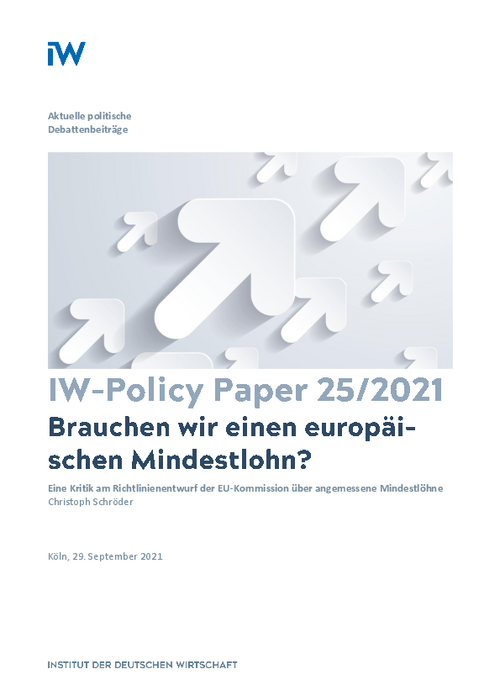In many countries, a paradigm shift in minimum wage policy is discussed, or it has been implemented already. Instead of protecting employees from exploitation as a lower safety line, the minimum wage is intended to provide an adequate standard of living - if possible without government intervention.

Do we need a European minimum wage?: A critique of the EU Commission's proposal for a directive on adequate minimum wages

In many countries, a paradigm shift in minimum wage policy is discussed, or it has been implemented already. Instead of protecting employees from exploitation as a lower safety line, the minimum wage is intended to provide an adequate standard of living - if possible without government intervention.
The political demands of many countries, including Germany, want to set the minimum wage at 60 percent of the gross median wage. In its proposal for a directive on appropriate minimum wages, the EU Commission also advocates higher minimum wages and calls on the member states to take the ratio to the gross median wage as a guideline. 60 percent is mentioned as a possible benchmark, but not explicitly demanded. The ratio of the minimum wage to the gross median wage of a full-time employee is called the Kaitz Index. A Kaitz Index of 60 percent is considered a Living Wage. However, this is more of a simplification used by trade unions and some political parties. The original Living Wage approach attempts to determine a basket of goods that describes an adequate standard of living, calculates the required net wage from the costs of this basket of goods, and in the last step derives the gross wage required for this. Thus, the Living Wage is inherently anchored in the net sphere. If taxes were reduced, the required (gross) minimum wage would fall, and if social security contributions were increased, it would rise. The extent to which results at the gross level can differ from those at the net level is most clearly shown by comparing Belgium with France. The Kaitz index is 61 percent in France and only 47 percent in Belgium, yet the net income position of minimum wage earners compared to employees paid at median earnings is better in Belgium than in France. Compared to the at-risk-of-poverty threshold, Belgian minimum wage earners also fare better on a net basis than their French counterparts. This example shows that a European minimum wage with a uniform Kaitz index should be rejected as it does not consider the differences in the tax, contribution and transfer systems of the EU member states. The proposal for a directive is legally controversial with regard to compliance with the competence barrier on wage issues and only vaguely justifies compliance with the subsidiarity principle. The impact assessment does not take into account interdependencies between poverty risk and employment, for example, and thus paints an overly positive picture of the possible effects. Moreover, a constant employment elasticity of the minimum wage is assumed. This ignores the fact that there may be tipping points at which a minimum wage increase has a strong negative impact. Structural increases in the minimum wage should therefore not be implemented abruptly but should be spread out over time and evaluated regularly so that overshooting can be revised by temporarily freezing the minimum wage level.

Do we need a European minimum wage?: A critique of the EU Commission's proposal for a directive on adequate minimum wages

More on the topic

German Wage Policy between Inflation and Stagnation: Are Conflicts with the Aims of Monetary Policy Looming?
After the economic and financial crisis of 2008/9, the German labour market soon began to recover, creating scope for a comparatively expansive wage policy.
IW
The Pros and Cons of Trade Union Membership
The decline in collective bargaining coverage in Germany is often attributed to the reluctance of companies to join an employers' association which negotiates collective agreements.
IW